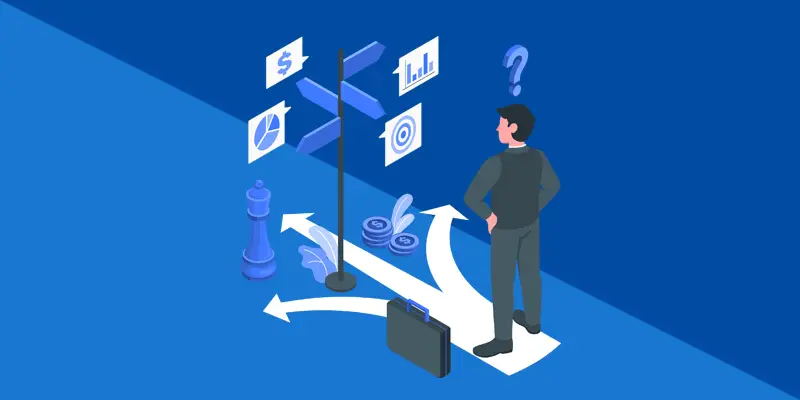Quick summary:
In 2026, the CPA remains the “gold standard” for accounting careers especially in the US. While it requires a 300–600 hour study commitment and exam fees ranging from $2,170–$8,170, the ROI is substantial. CPAs earn a lifetime average of $1 million more than non-certified peers and are legally required for high-level roles like signing audit reports.
If you’re exploring a career in accounting, or are already working in the industry, chances are you’ve heard people talk about the CPA designation like it’s the holy grail.
But here’s the thing: while becoming a Certified Public Accountant (CPA) can open some serious doors, it’s also a major commitment. We’re talking hundreds of study hours, thousands in exam fees, and a long slog of juggling work, study, and life.
It’s completely normal to wonder: “Is CPA worth it for me?”
The truth is that just like with a lot of qualifications, there isn’t a one-size-fits-all answer. It very much depends on where your professional interests lie and what your career goals are. It’s therefore important to equip yourself with the right information so you can make a confident, strategic decision about your future, and understand how much value a CPA will add to the path you want to follow.
With all that in mind, let’s take a look at some real numbers, honest pros and cons, and genuine insights into what the CPA path looks like today. For help in figuring out if earning those three coveted letters after your name is the right qualification option for you, read on!
- Why is the CPA designation important for your career?
- Does the CPA career path align with your professional goals?
- What does it take to become a CPA?
- What is the total cost of becoming a CPA in 2026?
- What else can you gain as a CPA (beyond the paycheck)?
- How does the CPA compare to other financial certifications?
- Common myths about the CPA
- What are the key advantages and disadvantages of being a CPA?
- Common Questions: Is the CPA still relevant in 2026?
- Final verdict
Why is the CPA designation important for your career?

So, what’s the big deal about the CPA anyway?
Well, the CPA designation is often considered a bit more than just another professional title. It’s a powerful career credential that represents trust, technical expertise, and a commitment to high ethical and professional standards in the world of accounting and finance.
And while it’s widely regarded as the gold standard of accounting qualifications, the CPA isn’t just for public accountants or auditors. It’s a career asset that’s recognized and respected across industries, whether you’re working in corporate finance, tax, consulting, government, or even startups.
In many accounting roles (especially those involving senior financial decision-making) having a CPA is not just something that’s “nice to have”, it is expected.
What are the legal benefits of having a CPA license?
While anyone can call themselves an accountant, only CPAs are legally allowed to perform certain high-level tasks, including:
- Signing off on audit reports and issuing attestation opinions
- Filing reports with the U.S. Securities and Exchange Commission (SEC)
- Representing clients in front of the IRS
- Leading audits, managing financial compliance, and providing certified financial statements
That means if you want to work in external audit, specialize in tax, move into financial leadership, or run your own public accounting firm one day, the CPA is certainly worth it because it’s a must-have requirement.
Why the CPA remains one of the most respected financial qualifications
The CPA has stood the test of time for a reason. It tells employers, clients, and colleagues that you’ve gone above and beyond the basic standards. It’s lasting confirmation that you’ve put in the hours, passed one of the toughest professional exams out there, and built your expertise on a solid ethical foundation.
It also sends a clear message: “I take my career seriously.”
Think of the CPA as a career catalyst. It not only validates your knowledge, but also opens doors to opportunities that non-certified professionals may never reach. If you’re aiming for long-term growth, credibility, and earning potential in the accounting or finance space, the CPA is possibly one of the most powerful steps you can take.
Does the CPA career path align with your professional goals?

Let’s be honest, earning a CPA license probably isn’t something you do on a whim. It takes time, energy, money, and a fair bit of patience. That’s why the most important question you can ask before committing is:
“Does earning the CPA actually align with where I want my career to go?”
For some, the answer is a clear yes. For others, there might be better options. To help you figure that out, here’s a quick reality check.
| You’re likely a good fit for the CPA if: | It might not be the right fit if: |
|---|---|
| + You want to work in public accounting, audit, or tax. | – You’re more interested in general business operations or marketing. |
| + You’re aiming for financial leadership roles (like Controller, Finance Director, or CFO). | – Your work doesn’t involve accounting, financial reporting, or tax. |
| + You like the idea of being a licensed expert who’s trusted with complex financial work. | – You want to avoid exams or formal licensing altogether. |
| + You’re willing to put in serious effort now for long-term professional reward. | – You’re looking for shorter-term credentials that are easier and faster to obtain. |
| + You plan to start your own accounting firm or consult independently. | – You don’t plan to live or work in the U.S. long-term (some international roles don’t require a CPA). |
| + You’re looking for career flexibility across industries and geographies. |
Still not sure? That’s completely normal. Many professionals start out unsure and gradually realize whether the CPA is worth it and how well it aligns with their goals as they gain experience.
If you’re on the fence, consider asking yourself these three questions:
- Where do I want to be in 5–10 years?
- Do the roles I’m aiming for require or prefer a CPA?
- Am I prepared to invest the time and energy over the next one to three years?
Remember: the CPA is a long-term play. It’s not about simply checking a box, it’s about shaping the kind of career you want to build.
What does it take to become a CPA?

There’s no sugar-coating it: becoming a CPA takes serious work. But understanding the full process from the start can help you plan ahead, avoid surprises, and stay motivated when things get tough. And of course, understanding what’s involved is essential information if you’re trying to decide if the CPA is worth it for you.
More on this topic: CPA Requirements: 5-Step Guide On How To Become a CPA
Let’s break down what’s actually required to earn your CPA license.
1. Meet the education requirements
While each state has its own CPA requirements, most require at least 150 college credit hours to qualify for the CPA exam. That’s 30 more than a standard bachelor’s degree, and usually means following one of two paths:
Path 1: Bachelor’s + extra coursework, often in accounting or business
Path 2: Bachelor’s + Master’s, such as a Master of Accountancy or MBA
You don’t necessarily need a full master’s to reach 150 credits, but many people go that route because it can also boost job prospects.
- Typical time commitment: 4–5 years of education
2. Pass the CPA exam
The CPA exam is known for being one of the most challenging professional exams in finance. But it’s absolutely passable with the right prep.
Candidates often underestimate how much study time they’ll need for the full set of CPA exams before starting, then realise they need to put more time in than they expected when they’re part way through. So be realistic with your schedule, especially if you’re working full-time.
As of the latest update in 2026, the CPA exam consists of three compulsory core sections and a choice of one discipline:
| Core sections (all required): | Discipline (choose one): |
|---|---|
| AUD: Auditing and Attestation | BAR: Business Analysis and Reporting |
| FAR: Financial Accounting and Reporting | ISC: Information Systems and Controls |
| REG: Taxation and Regulation (tax law, ethics, business law) | TCP: Tax Compliance and Planning |
In most places you have 18 months to pass all 4 parts once you pass your first section.
- Study time: Around 300-600+ hours (most candidates prep 2-3 months per section)
- Exam fees: $200-$250 per section (total ~$800-$1,000, excluding retakes)
- Passing timeframe: Often 12-18 months for working candidates
3. Gain the required work experience
To qualify for CPA licensure, most states require 1-2 years of supervised experience in accounting. This usually means working under a licensed CPA and gaining hands-on experience in things such as audit, tax, financial reporting, advisory or compliance, and attestation.
The good news is that you can often earn this while studying for the exam. In fact, most candidates work in an intern or entry-level accounting role to fulfil their experience requirements while they’re preparing for and taking the exam.
- Typical time commitment: 1-2 years of experience
4. Fulfill your state’s ethics requirements (where applicable)
A lot of states (but not all) require candidates to pass a separate ethics exam before applying for a license. The most common of these is the AICPA’s Professional Ethics: The American Institute of Certified Public Accountants’ Comprehensive Course.
This exam isn’t usually considered too difficult, but it’s important to factor in some time to take the course and sit the exam as part of the process.
- Typical time commitment: 11 hours to complete the course
5. Apply for licensure
Once you’ve met your education requirements, passed all four CPA exams, completed your work experience, and met any ethics requirements, you’re ready to apply for licensure through your state board.
This typically involves submitting a form, along with evidence of all the required qualifications, exam scores, and experience. In some states you might also need to provide proof of residency, or proof that you’re able to legally work in the U.S.
Full licensing timelines vary, but plan for a few months after finishing your exams and experience.
What are the steps to complete the CPA journey?
If you’re trying to decide if a CPA is worth it and want to know how much time you’ll need to put in all together, here’s a realistic overview:
| Stage | Estimated Time |
|---|---|
| Education (bachelor’s + extra credits) | 4-5 years |
| Studying for CPA exams | 12-18 months (part-time) |
| Gaining work experience | 1-2 years (can overlap with study) |
| Ethics course (if needed) | 11 hours |
| Licensing & paperwork | A few months post-exams |
So yes, earning a CPA can be quite a long process. But for many, it’s a once-in-a-career investment that pays off for decades.
What is the total cost of becoming a CPA in 2026?

Let’s face it, one of the biggest questions on your mind before starting your CPA journey is probably: “How much is this going to cost me, and will it actually be worth it?”
The short answer to the second part of that question is yes.
For most people pursuing a career in accounting or finance, the CPA offers an exceptional return on investment. But let’s break that down with some real numbers.
What does the CPA typically cost?
While the exact amount varies depending on your location and how you prepare, here’s what most candidates can expect to spend:
| Item | Estimated Cost |
|---|---|
| Application & registration fee: | $50-$400 |
| Exam fee (four sections @ $262.64 each): | $1,050.56 |
| Review course/study material: | $1,000-$6,000 |
| Ethics exam: | $0-$320 |
| License application: | $50-$400 |
| CPA total cost: | $2,150.56-$8,170.56 |
This doesn’t include the cost of any extra college credits or a master’s degree, as these can vary depending on which course/s you take and which school you go to. But if you’ve already completed your 150 credit hours, you’re likely halfway there.
It is also worth mentioning that some employers will cover or reimburse CPA-related costs, especially larger firms. Qualified CPAs are highly valued and in-demand by a lot of companies, so helping you to get your license can be a good investment for them. This is certainly something to ask about if you’re interviewing, or to speak to your employer about if you’re already in a role.
The salary bump: How much more do CPAs earn?
This is where the CPA starts to shine.
On average, CPAs earn 10% to 20% more than their non-CPA peers. That gap widens the further you move up the ladder, especially into senior, managerial, and executive roles.
Explore this topic in more depth: CPA Salary – How Much More Do Certified Public Accountants Make?
For now, let’s take a look at some examples of differences in annual salary:
| Role/Level | Without CPA | With CPA |
|---|---|---|
| Entry Level | ~$55K | ~$65K |
| Accountant | ~$70K | ~$85K |
| Senior Accountant | ~$90K | ~$110K |
| Manager | ~$110K | ~$135K |
| Director/CFO | ~$150K | $200K+ |
Depending on your position and industry, that’s an extra $10,000-$50,000+ per year. Over the course of a 30-year career, it can easily add up to well over $1,000,000 in additional lifetime earnings.
How fast do you cover your CPA costs and what is the ROI?
| Factor | Estimated Investment | Potential Career Return |
| Financial Cost | $2,150 – $8,170 (Fees & Prep) | $1,000,000+ extra lifetime earnings. |
| Study Time | 300 – 600+ Hours | Prerequisite for CFO and Partner roles. |
| Education | 150 semester Hours | Legal authority to sign audit reports. |
| Work Experience | 1 – 2 Years on average | High job security and global prestige. |
Let’s say your total CPA journey costs you $4,000. With even a $10,000 raise after certification, you could cover that in less than a year. Many candidates recoup the investment in their very first post-CPA role.
The break-even point of a CPA is fast, but the long-term payoff is where it really gets impressive.
Imagine you pursue an accounting career, having completed your CPA, and reach the position of CFO. A conservative estimate is that you’ll earn around $50,000 more per year than someone with a similar amount of experience, but without a CPA license.
If you were to remain in that role for 10 years, and your initial costs to get your license were towards the top end at $5,000, that’s a potential 9900% ROI from that position alone. Now extrapolate that over the course of a full career, and you can see how the ROI on completing a CPA can be very impressive.
There are of course a wide range of factors that can influence salary, especially as you move up in your career. But all other things being equal, a CPA would typically give you a significant salary increase over a comparable role without a CPA.
When might the ROI of a CPA be lower?
Based on the examples above, you might be wondering “Why wouldn’t a CPA be worth it?” Well, there are a few scenarios where the financial benefit may not be as strong, that you should be aware of:
- You work in a non-accounting role that doesn’t reward the CPA (e.g. operations or admin)
- Your industry doesn’t typically require licensure (e.g. early-stage startups, smaller nonprofits
- You plan to switch careers or leave accounting/finance altogether
- You live in a region or country where the CPA isn’t widely recognized
That doesn’t mean it’s not worth doing, because the CPA is still an impressive credential to have on your resume and might help you land jobs that aren’t directly related to it. But it’s important to consider whether the roles you’re aiming for actually reward the qualification through the compensation they offer.
So… is the CPA financially worth it?
If you’re serious about staying in the accounting or finance field, and especially if you want to move up into management, advisory, or leadership, the CPA is could be one of the best investments you can make in your career.
A CPA license pays for itself quickly. And more importantly, it can unlock career paths and earning potential that would otherwise stay out of reach.
However, if you’re not planning to follow a career path that requires a CPA, you might not see the same level of ROI from getting your license. If you think this might be you, there are other financial qualifications that could actually be better suited to you. We’ll take a closer look at some of these further down the page.
What else can you gain as a CPA (beyond the paycheck)?

So far, assuming you’re actually planning to build a career in the accounting sector, the financial side of the CPA equation paints a pretty compelling picture. But what you can gain from achieving this qualification actually goes far beyond a bigger salary.
Let’s take a look at some of the other reasons why a CPA might be worth it for you:
Career mobility & advancement
The CPA license is a career accelerant. Whether you’re starting out or aiming to level up, the credential signals to employers that you’re serious, capable, and trustworthy. As a CPA, you’ll be better positioned to:
- Be promoted into managerial and leadership roles (once suitably experienced)
- Take on higher-responsibility work, including financial reporting, internal controls, and compliance
- Qualify for specialist positions in audit, tax, forensic accountic, and advisory
- Transition more easily between industries or even countries (especially if you work with U.S. firms)
Greater job security
Accounting is one of the few fields where licensure directly improves your employability, even during economic downturns. There are a few reasons why:
- Many roles legally require a CPA (e.g. signing audit reports)
- Companies need CPAs to navigate complex regulations and tax laws
- Licensed professionals are often seen as more reliable and resilient hires
Having your CPA can be the difference between being considered and being hired, especially when competition is tight. Given that the U.S. Bureau of Labour Statistics projects above average growth in the accounting sector into the next decade, and that there is currently a shortage of qualified CPAs in the market, gaining your license is a good way to get into an industry where there’ll be plenty of demand for your skills.
Professional credibility & trust
Let’s be real: adding “CPA” after your name changes how people perceive you. Whether you’re talking to clients, executives, or future employers, it shows:
- You’ve passed a tough, standardized set of exams
- You uphold a strict code of ethics
- You’ve committed to ongoing learning and accountability
In a field that values precision and integrity, the CPA gives you built-in credibility. It tells people, “You can trust me with your numbers.”
While this might be a softer benefit of the CPA, it can be one that pays dividends throughout your career. Whether you’re starting up your own firm, interviewing for a new role, or need to get clients on-board with a project, credibility counts.
Career flexibility
One of the most underrated benefits of the CPA is that it doesn’t lock you into one single path. In fact, it opens up several. As a CPA, you can build a career in areas such as:
- Public accounting
- Corporate finance
- Tax advisory
- Government or nonprofit roles
- Internal audit and risk management
- Your own accounting practice
The CPA credential gives you the flexibility to pivot or specialize over time, without having to start over from scratch.
For a deeper dive on this topic, head over to our article CPA Career Path: Roles, Progressing & Specializing as a CPA.
Long-term leverage
Think of the CPA as career capital. Once you have it, you’ll carry that credibility with you for life. You’ll also have:
- Access to stronger professional networks (e.g. AICPA and state societies)
- Opportunities for continuing education (which is actually required in most states) and specialization
- A license that helps you negotiate better roles, raises, and respect
So yes, while the initial requirements that include passing exams, gaining experience, and funding your CPA might not seem like a walk in the park, the leverage it gives you over the rest of your career means that getting your licence could ultimately be well worth it.
How does the CPA compare to other financial certifications?

When applied to the right financial career path, the CPA is undoubtedly a powerful credential. But it’s not the only financial qualification that should be on your radar. Depending on your career goals, interests, and industry, another certification might actually be a better fit (or even complement your CPA down the line).
Perhaps the most notable is the Chartered Financial Analyst (CFA), which is often considered to be one of the world’s toughest exams. However it can also lead to some very attractive rewards.
Get the full lowdown on how the CFA compares to the CPA in our detailed comparison CFA vs CPA: Which Is Best For You.
If you’re wondering whether the CPA is worth it, but haven’t yet locked in accounting as the financial career path you’re going to follow, some other qualifications to consider are:
- Chartered Financial Analyst (CFA)
- Certified Management Accountant (CMA)
- Certified Financial Planner (CFP)
- Enrolled Agent (EA)
- Master of Business Administration (MBA)
Here’s how the CPA compares to all of these:
| Qualification | Best For | Avg. Time to Complete | Difficulty | Estimated Cost | Ideal Career Paths |
|---|---|---|---|---|---|
| CPA | Public / corporate accounting, audit, tax | 12–24 months | High | $2.5k–$5k | Auditor, Controller, CFO |
| CFA | Investment analysis, portfolio management | 2–4+ years | Very High | $3k–$6k | Analyst, Investment Manager |
| CMA | Internal/corporate finance, cost accounting | 9–12 months | Moderate | $1k–$2.5k | FP&A, Finance Manager |
| CFP | Personal financial planning, wealth advisory | 12–18 months | Moderate | $2k–$4k | Financial Planner, Wealth Advisor |
| EA | Tax preparation and planning (U.S. focus) | 3–6 months | Low | $500–$1k | Tax Preparer, IRS Rep |
| MBA | Broad business/management | 1–2 years full-time | Moderate | $20K–$200K+ | Management, Strategy, Startups |
When should you choose the CPA?
There are some roles and careers where the CPA is a requirement, and for these it’s absolutely the right choice. You should strongly consider it if:
- You want to work in accounting, tax, or audit
- You’re looking for licensure and legal authority
- You’re aiming for leadership roles in finance
- You want a versatile, career-long credential
However, after comparing your options, you might still be wondering if the CPA is really the right move for you. And we absolutely understand. After all, this isn’t a decision to rush, especially when it involves time, money, and energy. But here’s a way to think about it:
The CPA is a foundational, career-long credential. It’s not just for people who want to do taxes or audit financial statements forever. It’s for people who want options.
With a CPA, you can make career moves like starting out in public accounting and later transition into industry, or moving from compliance work into leadership or advisory roles.
It also gives you opportunities to step into higher-responsibility positions with more credibility and negotiating power, or even pivot into finance-adjacent roles like consulting, risk, or operations where your accounting background becomes highly valued.
When should you consider an alternative?
You don’t have to become a CPA to be successful in finance. If your interests lie more in investments (CFA), financial planning (CFP), or internal strategy and operations (CMA or MBA), those paths might be better aligned, and quicker to complete.
And that’s okay, the key is to choose a path that fits your goals, not what someone else tells you is the “right” certification. Here’s a quick table to help you figure out which qualification suits you best:
| Ask yourself this: | If you answer yes, consider: |
|---|---|
| Do I want to work in public accounting or sign audit reports? | CPA |
| Am I aiming for internal finance roles or corporate strategy? | CMA |
| Is my focus on investment, asset management, or banking? | CFA |
| Do I want to specialize in tax preparation and IRS representation? | EA |
| Am I pursuing general business leadership or entrepreneurship? | MBA |
| Do I want to help clients plan for the future and manage wealth effectively? | CFP |
You should also bear in mind that you’d don’t have to complete just one financial qualification. It’s not necessarily a CPA versus everything else, it’s whether a CPA can help you in the career you’d like to build; either on its own or in combination with something else.
The trick is to pick the qualifications that best suit you on an individual level.
Here are a few examples of how this could work:
- Combining a CPA with a CFA would make you an expert in corporate finance and valuation, and able to assess investment opportunities across multiple levels.
- Combining a CPA with a CFP would make you an extremely tax-savvy (and valuable) financial planner or wealth advisor.
- Combining a CPA with an MBA would give you a strong foundation in accounting know-how, with leadership and strategy skills layered on top.
So even if CPA isn’t your first move, it could still play a role later in your career.
Common myths about the CPA

The CPA license has been around for over a century (it was established in New York in 1896), and with that kind of legacy comes a few myths, half-truths, and misunderstandings. If you’re on the fence about pursuing it, chances are you’ve heard at least one of these.
But if you’re looking to answer the question “is the CPA worth it?”, it’s important not to let misinformation put you off. So let’s set the record straight.
Myth 1: You need to be amazing at math to pass
Nope. You don’t need to be a calculus genius or love algebra to become a CPA. Most of the math involved is practical: percentages, ratios, financial formulas, and understanding reports. What matters most is your ability to understand concepts, apply logic, and work through scenarios under pressure.
Myth 2: The CPA is only useful if you want to be an auditor
Wrong again. While CPAs are needed in audit, the credential is just as valuable in tax, corporate finance, financial reporting, risk and compliance, and CFO or controller roles. In fact, many CPAs never set foot in public accounting. The designation is versatile and applies across a wide range of industries.
Myth 3: You need a master’s degree to become a CPA
Not necessarily. You need 150 credit hours, not specifically a master’s degree. That could mean taking extra undergrad coursework, completing a certificate program, or yes, earning a master’s. But it’s not an absolute requirement. Check your state board’s rules, and don’t assume you have to go back to grad school if you don’t want to.
Myth 4: It’s impossible to pass the CPA while working full-time
Tough? Yes. Impossible? Definitely not. Thousands of candidates pass the CPA exam each year while holding down full-time jobs. It takes planning, sacrifice, and consistency, but it’s 100% doable. In fact, as we mentioned earlier in this article, a lot of candidates complete the experience part of their CPA requirements while studying for the exam. One of the main reasons they do this is because it’s more time-efficient.
Myth 5: If you fail once, you’re not cut out for it.
Failing a section of the exam doesn’t mean you’re not CPA material, it means you’re human. Plenty of CPAs don’t pass every part on the first try (especially FAR or REG). What matters is learning from it and adjusting your study strategy.
What are the key advantages and disadvantages of being a CPA?

If you’re still on the fence, sometimes a good old-fashioned pros and cons list is the best way to cut through the noise and help make a decision.
You might want to make your own list to help you decide whether a CPA is worth it, based on what you value most or consider to be a negative. But for a bit of extra help, here’s how we think the CPA stacks up:
| Pros of becoming a CPA | Cons of Becoming a CPA |
|---|---|
| Higher Earning Potential: CPAs earn 10–20% more than non-licensed accountants on average, and the gap grows with seniority. | Time-Intensive: Around 500 hours of study and exams, plus 1-2 years experience requirements. |
| Career Flexibility: Work in public accounting, corporate finance, audit, tax, or even consulting. | Cost: $2,500–$5,500+ for review courses, exam fees, and licensing. |
| Leadership Potential: A CPA is often a prerequisite for promotion to controller, CFO, or partner. | Not Required for All Roles: If you’re not planning to work in accounting or audit, the CPA may not be essential |
| Job Security: Demand for CPAs is strong, and is forecast to remain so into the future. | State-by-State Rules: Education, experience, and licensing requirements vary, which can complicate the process |
| Credibility & Trust: A CPA acts as a lasting signal of professionalism, ethics, and expertise to employers and clients. | Ongoing CPE: You’ll need to maintain your license with annual continuing education hours |
| Licensing Authority: Only CPAs can sign audit reports and represent clients before the IRS. | |
| Respected Globally: The CPA is recognized and respected across industries and borders. |
Common Questions: Is the CPA still relevant in 2026?

Final verdict

So, after all the time and effort to study, pass exams, and gain experience, plus the cost; is becoming a CPA really worth it?
The honest answer is that really, it depends on where you want to go.
When the CPA is worth it
- You’re building a long-term career in accounting, audit, tax, or corporate finance
- You want access to senior roles, like controller, CFO, or firm partner
- You’re looking for credibility and stability in a competitive industry
- You value a credential that provides career leverage and flexibility
- You’re willing to make a short-term sacrifice for long-term gain
In these scenarios, the CPA can deliver an exceptional ROI, both financially and professionally. It’s a powerful signal to employers, clients, and colleagues that you’re serious about your career and qualified to lead.
In relevant roles, having a CPA can give you access to some great career opportunities that you wouldn’t otherwise qualify for, and can lead to significantly higher earnings over the course of your career.
When the CPA might not be worth it
- Your role doesn’t involve accounting, financial reporting, or regulatory oversight
- You’re focused on investing, operations, entrepreneurship, or non-financial roles
- You want a faster, less intensive credential that still boosts your resume
- You’re planning to leave the profession or don’t need a license to grow in your field
If this sounds more like you, there are other great options out there like the CMA, CFP, CFA, or MBA that could better match your goals. Pick the one that best suits the financial career path you plan to go down.
A valuable foundation for a career in accounting
Ultimately, the CPA is a qualification that can help build your career. So if accounting is the career path you want to follow, the CPA could very much be worth it for you. Sure, it requires effort, but for many professionals, it becomes a foundation for decades of opportunities, financial reward, and professional confidence.
It’s a credential you earn once and benefit from for the rest of your career.
If you’re even seriously considering the CPA, that’s a sign you’re already thinking about the big picture. And that mindset alone puts you on the path to long-term success.
I hope this framework helps you now feel a bit more confident in deciding if the CPA is right for you. Here are some other articles you might also find useful:
- CPA exam guide: A concise overview
- CPA Exam Dates & Score Release: Your 2025 Master Plan
- CPA Career Path: Roles, Progressing & Specializing as a CPA
- CPA Requirements: 5-Step Guide On How To Become a CPA
- CPA Salary – How Much Do Certified Public Accountants Make?
- Finance Career Quiz: Which Career Fits Your Skills & Personality?